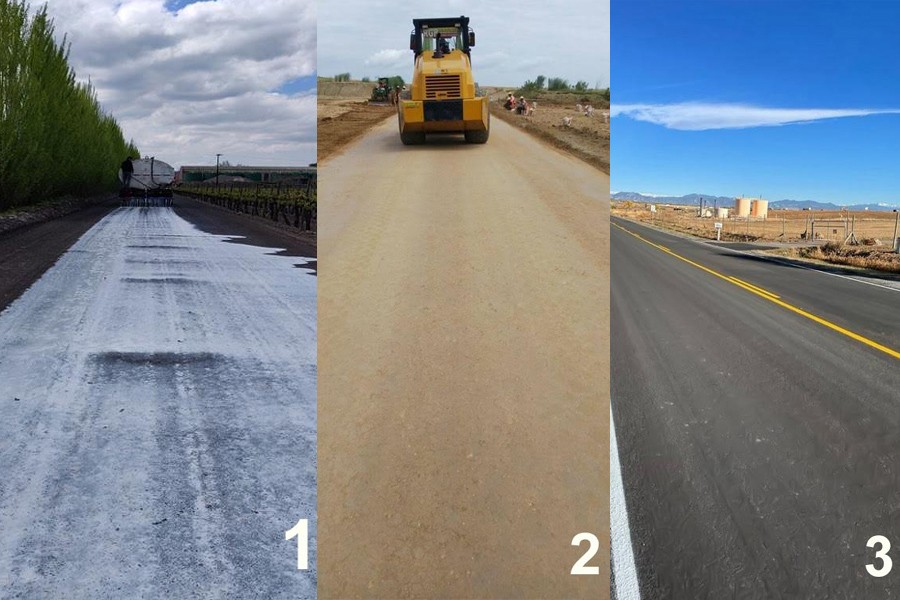Bangladesh's government is going to take a pilot project for using nanotechnology in the construction of roads for ensuring road safety to implement the Sustainable Development Goals (SDGs) by 2030.
Under the project, the government will use ‘acrylic polymer’, a state of art in echo-friendly nanotech product, to reduce road construction costs by at least 30 per cent as well as ensure safer roads than the traditional ones.
As per the instructions, the Road Transport and Highways Division (RHD) is preparing a Development Project Performa (DPP) for the project, Fazle Rabbe, the Additional Chief Engineer of the RHD, has said.
"We have selected four areas in Sylhet division to construct roads by using the nanotech-based chemical which will drastically minimise time and cost in constructing durable roads and highways,” he said.
“The new technology is going to open a new horizon for the country's fast-growing communication sector," he added.
He said the initiative will also contribute to two SDG targets that address road safety: SDG target 3.6 on halving the number of global deaths and injuries from road traffic accidents; and SDG target 11.2 on providing access to safe, affordable, accessible and sustainable transport systems as well as improve road safety, reports BSS.
Rabbe said an initial study by an expert group came up with a conclusion that the technology was suitable for the soil of any type across Bangladesh and it would reduce road construction cost by at least 30 per cent.
Earlier, a six-member expert team ran a field test of the acrylic polymer at the Matarbari area of Cox's Bazar's Maheshkhali area and found it "highly effective".
They collected soil from 22 districts of different regions of the country and tested them in different ratios with K.31 APS acrylic polymer and the findings suggested it suits all types of soil in Bangladesh.
They also carried out a financial analysis and found it to be highly cost-effective as well. The technology is also highly sustainable for those roads which go frequently underwater and stay underwater for long days.
The use of acrylic polymer will ensure that there will be no potholes in roads even in the rainy season and it will minimize road accidents. It will also increase the longevity of vehicles due to smooth roads.
Rabbe said like plastics the "water resistant" acrylic polymer is "nearly imperishable" which would simultaneously increase load bearing capacity of roads.
"So we expect it will enhance the sustainability of our roads by at least 50 years and thus minimize their maintenance cost to a minimal level," the RHD official said.
Several infrastructure experts said the technology by now came within Bangladesh's reach and it could be used also to construct dams and embankments at much lower costs in quicker periods.
RHD Executive Engineer Md Shahriar Rumi said the acrylic polymer is currently being used in the United States, Canada, Australia, Malaysia and several Middle Eastern countries while India and Bhutan also started using it for road construction.
The Indian army successfully used the K.31 APS brand of acrylic polymer in the rugged Ladakh region of Kashmir, while the United States Marine forces first developed the product to be used subsequently by the US military and air force in their country and elsewhere, he informed.
Explaining the technique, Rumi said in the traditional method bricks and stone chips are used as the main ingredient to construct the road base and road sub-base but the use of acrylic polymer would make these major elements redundant.
"No stone or brick will be required in the process which means the new technology will develop Bangladesh's air quality reducing carbon emissions by abandoning the brick-burning process," he said.
Under the new technique, he said, a chemical reaction of the acrylic polymer with sand and soil would create the foundation of roads and "you must also note that the bonding of the materials occurs very quickly in this method".
"The chemical reaction creates a nano-polymerised grid which makes a special layer and has elastic properties this layer also prevents erosion, a usual problem seen in existing roads," Rumi said.
He added: "Mixed with soil and sand, acrylic polymer causes the chemical reaction to create the foundation of the road (base and sub-base), which is far stronger than the traditional road infrastructure, strengthening road carpeting as well."
Rumi said the use of acrylic polymer would drastically reduce imported stones demand for road construction in the country and "nearly 70 per cent of the materials to be used for road construction under the method are available in the country".
He said the surface layer of the roads could be built with the mixture of widely available thrown-away plastic water bottles or pet bottles, polythene bags and locally produced bituminous to be mixed at a temperature from 160 to 170 degrees Celsius.
"This will save a huge amount of foreign currencies," he said.
Deputy Team Leader of a consultant firm involved in the road infrastructure component of the Matarbari Ultra Super Critical Coal-Fired Power Project Md Abul Hossain said the use of chemicals for highway construction to avoid the use of bricks for sub-base and stone chips for base construction will contribute improvement of environmental health.
"As there is no use of brick in the highway construction by chemically stabilised layer, the topsoil will be saved which will contribute a positive impact on our food security (a big concern of future food availability to the people especially for the poor of the world). Also, reduce the cost of highway construction by 10 per cent - 15 per cent; saving huge hard currencies expenses to import rock," he added.
Abul Hossain said collection of sand from the riverbed will provide additional depth of river thereby more water could be accommodated during the high flood.
This technology shall open a new horizon for the fast-growing highway construction sector in Bangladesh, he added.


